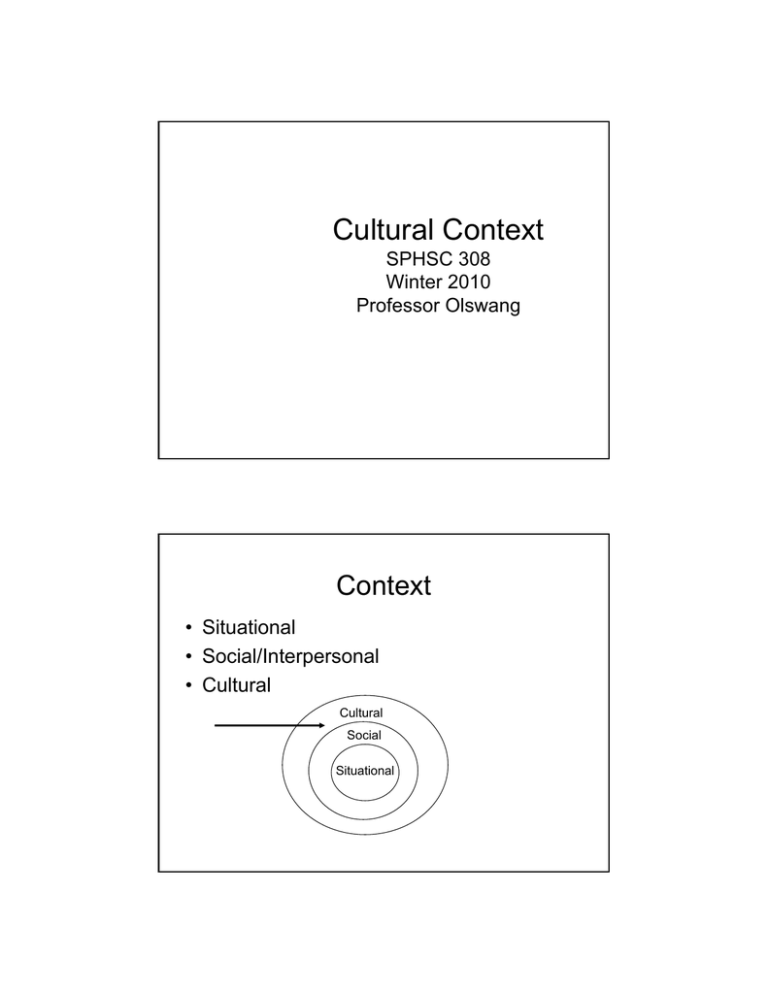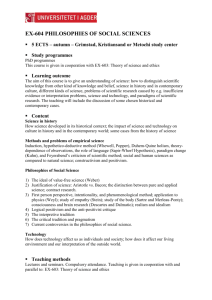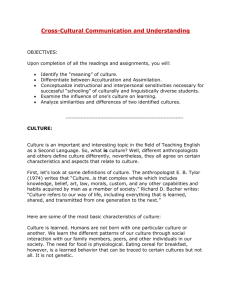Cultural Context Context • Situational • Social/Interpersonal
advertisement

Cultural Context SPHSC 308 Winter 2010 Professor Olswang Context • Situational • Social/Interpersonal • Cultural Cultural Social C Situational Culture Lecture • Culture as context – Types of culture – Defining culture • Cultural Practices (Qualifiers) • Cultural Philosophies • Methods for examining culture What is culture? • What did you find out from your search? Work in group. Come up with key elements for a definition of culture. Culture Elements: Shared by people in community Common goals, rules, customs, traditions, rituals, values, norms, beliefs, institutions, Passed down from generation to generation Ever-changing, adapting Conscious bond-awareness of belonging Lifestyle, identity Observable/Products (art, food, music, language, architecture, etc.) Aesthetics Way of learning Way of viewing the world Culture is: (Duong Phan, summer 2004) Topical List of topics, categories (e.g., religion, economy) Historical Social heritage, or tradition, passed on Behavioral Shared, learned human behavior, way of life Normative Common ideals, values, goals, rules Functional Way to solve problems, adapting, living together Mental Complex ideas or learned habits that inhibit impulses Structural Patterned and interrelated ideas, symbols or behaviors Symbolic Arbitrarily assigned meanings that are shared What is Culture? Two Major Types • Personal Culture – Biological aspects of our being over which we have no control – Examples: age, race, ethnicity, gender • Social Culture – Rules for living – beliefs, values – Created by our environment, society, social setting, institutions to which we belong Social Culture – our class What is the smallest size of a culture? Can you shed your culture? Can you adopt a new culture? Can culture be empowering? Social Culture – Human Ecology • Big picture of view of systems • Hierarchy of systems (Urie Bronfenbrenner) (co-founder of Headstart) systems and subsystems – Microsystems – person and his/her individual contacts (family, school) – Mesosystems – immediate connections (family and teacher, church activities) – Exosystems – institutions (school board, community, church) – Macrosystems – social culture, cultural values, customs, laws. Ecological Approach (Bronfenbrenner) Influence of Social Culture Influence of one “system” in the hierarchy on another • QUESTION? Give an example of how a cultural change/event at the Macro level has shaped your family and/or you (Meso and/or Micro level) Social Culture – Defined by Cultural Practices Culture: Common goals, rules, customs, traditions, rituals (behaviors) that are shared by others in the community, and which are observable, passed down from generation to generation, but also ever-changing, adapting – focus on PRACTICES • Practices are actions. What people do. • Practices are open to observation by the researcher and others in a social group. Cultural Practices: Qualifiers • Actions have a routine or repeated quality • Actions are shared with others in a social group • Actions are not neutral--they come packed with values about what is right, natural, mature, or aesthetically pleasing to the members of the group Cultural Practices: Qualifiers continued • Actions can be sustained, changed or challenged • Actions are invested with normative expectations as to how things should be Cultural Practices Normative Expectations • Actions that have the greatest frequency for a group (mode) • Actions that are closest to the average for a group (mean) • Actions that represent the mid-point between extreme poles of the range (median) Cultural Practices • Means by which culture can be observed • Allows for new members • Allows for observing how culture can be passed from generation to another AND yet adapt Examples of Culture – Using Practices OTHER? • What is your culture? • Pair-share – Identify your culture based on a cultural practice Cultural Philosophies • Along with cultural practices, philosophies assist in defining cultures • Philosophies are major beliefs that describe a cultural group • Philosophies tend to be broad, sweeping characteristics • Sometimes they can be seen in practices…sometimes they are just understood Four Major Philosophies of Cultural Groups • • • • Individualism---Collectivism Verbal---Nonverbal Masculine---Feminine Powerful---Powerless Consider America as a culture Consider definition and an example for each Individualism---Collectivism • Individualism –culture that identifies the individual as the key element –individuals are encouraged to improve themselves through learning and skill development –achieving life objectives and personal happiness is the ultimate goal Individualism---Collectivism • Collectivism –culture that identifies society as the key element –individuals should resist personal ambition and try to “blend in with the crowd” –Society/community is the key to prosperity as the ultimate goal Verbal --- Nonverbal • Verbal – Talking is important – Story telling • Nonverbal – Art/dance important Masculine---Feminine • Masculine –fight or flight –world filled with danger which must be conquered or controlled –building safe place to live and protect loved ones –aggressive Masculine---Feminine • Feminine –world in delicate balance of many diverse forces which must be kept in harmony through careful nurturing –importance of inner peace –progress may be rejected if balance is disturbed Powerful---Powerless • Dominant, superior---in-group mentality • Submissive, subordinate –outgroup mentality • influenced by socio-economic status (i.e., more resources yields more power) What is your social culture? How does it fit with your personal view? Cultural view? • Individualism---Collectivism • Verbal---Nonverbal • Masculine---Feminine • Powerful---Powerless Cultural Practices How do they persist? Change? • Cultural practices have some permanency-conformity is encouraged in most cultures • Cultural practices can change-change occurs via several processes, including those which occur within a culture and those which occur between cultures All Practices Have a History • Practices become part of a “natural“ order – the expected – They carry the “history” of a group forward – (e.g., cultural philosophies illustrate this) • Practices also change based upon processes within the culture and coming together of cultures – Practices are extended and change based upon learning about options, limits and new practices Cultural Change • Change as a product of cultural practices evolving (within cultural change) – Individual to individual – Generation to generation – Practices permeate, expand, become increasingly different • Change as a product of cultures coming together (between cultural change) – Practices permeate, expand, become increasingly different Cultural Change • Within cultural influences – Maturation – Modernization (e.g., technology) – Others? Cultural Change • Between cultural influences – Enculturation – Assimilation – Acculturation Consider: Joining the armed services in a country Enculturation The process by which an individual learns the traditional content of a culture and assimilates its practices and values Involves purposeful effort or teaching of new culture – Example: Boot Camp – goal: to become a ldi Assimilation Assimilate - a : to make similar; b : to alter by assimilation; c : to absorb into the culture or mores of a population or group Emersion into new culture Adoption of new culture Loss of / rejection of old culture Example: Grandparents / great-grandparents – goal: to become “American” Acculturation Cultural modification of an individual, group, or people by adapting to or borrowing traits from another culture; also a merging of cultures as a result of prolonged contact Maintaining cultural practices while adopting new ones Example: New immigrant Goal: Become an American citizen but keep some/many of one’s cultural identity Acculturation • Can be measured: – Qualitatively E.g., Interview – Quantitatively E.g., The Acculturation Rating Scale for Mexican Americans (ARSMA) (Rodriguez, B., & Olswang, L. , 2002) Cultural Change • Melting Pot What is this? Which term applies? – Enculturation – Assimilation – Acculturation Appraising Cultural Context • How would qualitative methodology be useful in appraising cultural context? – Observation – Interview Culture - Illustrations – Writing Assignment – Spirit Catches You




